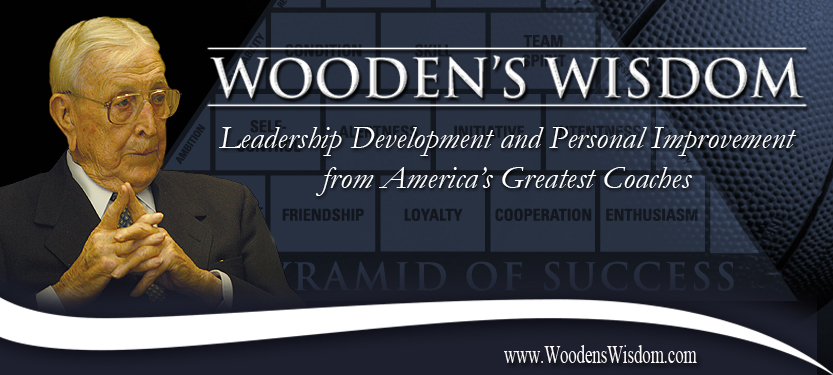 |
|
| Wooden's Wisdom - Volume 8 | Issue 338 |
| Craig Impelman Speaking | Championship Coaches | Champion's Leadership Library Login | |
|
COMMUNICATION SHOULD BE CLEAR, CONCISE AND COMPELLING - (TOM OSBORNE PART THREE)
Hall of Fame College Football Coach Tom Osborne, who led Nebraska to three national championships and thirteen conference championships in his twenty five years as head coach, was an excellent communicator. This skill served him well after coaching when he became a three term congressman in Nebraska and later when he returned as Athletic Director.
In Mike Harrity's book Coaching Wisdom, Coach Osborne describes how he communicated with his players about competing:
"I read in one of John Wooden's early books that he never talked about winning to his players. I thought that was really odd. Here's a person who, in many ways, has won more than anyone, and he never talked about winning. He continually talked about the process — how you put your socks on, how you bend your knees, how you pass — the fundamentals and the daily things that you do that eventually lead to either winning or losing. After reading that, I don't know that I ever talked to my players about winning. We talked about how you did things. It was more about the process than the final result."
Osborne holds both a master's and a doctorate degree in educational psychology and this helped him develop a compelling communication style which he described in Coaching Wisdom:
"Some of my approach to coaching goes back to my graduate work. I was in educational psychology and looked at learning theory quite a bit. It seemed that the research pointed to the fact that the best way to change behavior was to catch somebody doing something right and to positively reinforce it. I felt that it was probably beneficial to the performance to be positive, to try to reinforce the behavior you were looking for. It didn't mean you ignored mistakes or you tolerated a lack of effort or bad behavior, but you didn't attack the person in a personal way. I felt that even if you corrected a player, you let him know that you're doing it in his best interest. You could be very demanding and have very intense effort from players if they felt that what you were asking them to do was in their best interest and if, underneath it all, you cared about them as people. I felt that was important, and I think they can sense very quickly whether you genuinely care about them or whether you're putting on a front. I think it's important to be authentic."
Osborne was clear when he described what success meant to him:
"Success really has to do with having a good work ethic, being of sound character, making sure that you try to be a person of your word and that if you say something you're going to do it. That you're trustworthy. I think it's important to care about your employees, your players, the people that work under you, and try to make sure that they have the best possible outcomes, that you don't use them for your devices or purposes."
Coach Osborne had a compelling message. What's yours?
Yours in Coaching, Craig Impelman
|
IT'S NOT THE CRITIC THAT COUNTS "It is not the critic who counts; not the man who points out how the strong man stumbles, or where the doer of deeds could have done them better. The credit belongs to the man who is actually in the arena, whose face is marred by dust and sweat and blood; who strives valiantly; who errs, who comes short again and again, because there is no effort without error and shortcoming; but who does actually strive to do the deeds; who knows great enthusiasms, the great devotions; who spends himself in a worthy cause; who at the best knows in the end the triumph of high achievement, and who at the worst, if he fails, at least fails while daring greatly, so that his place shall never be with those cold and timid souls who neither know victory nor defeat." Theodore Roosevelt (1858-1919 - 26th President of the United States)
|
|
For more information visit www.woodenswisdom.com |
|
© Copyright 2024 WoodensWisdom.com | # of Times Wooden's Wisdom Issues Opened: 6,737,244
Hosting & Design by:EverydayWebDesign.com